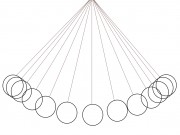The Seinfeld episode “The Contest” sums up the self-control and virtues of masturbation; stress reduction, sleepiness, and self-worth. Hysteria is based of the early history of how the vibrator became the favored instrument for women, although its initial use was meant to relieve women of bouts hysteria during the Victorian era. Although charming and slightly humorous, the film looses steam as it relies on the topical giggles a touch too much.
Forward thinking Dr. Mortimer Granville (Hugh
Hysteria is based on the true historical treatment of the improperly diagnosed women’s hysteria using erotic massage as treatment. As the film suggests, the Victorian repression caused stress and unease, and it just so happened that these supposed paroxysmal convulsions were the solution. Yet, it is in fact the relief that these women sorely needed, and Mortimer happened to be the favored practitioner of the treatment. His talent faded as his dominant hand became sore after weeks of a full schedule. His roommate Edmund is fascinated with technology, specifically electronics, and his failure to produce an electronic cleaning machine instead creates the perfect machine to relieve Mortimer’s hand of the bulk of the work.
Both Mortimer and Charlotte have a more progressive stance on social and medical issues, choosing to implement new scientific evidence on preventing disease by maintaining cleanliness when tending to wounds and daily habits. Although Charlotte is from a wealthy family, she chooses to work with the women and children of lesser means, fighting for every pound to maintain her shelter. The fight for women’s safety and health parallels that of the introduction to the vibrator which Mortimer and Edmund inadvertently invent. The film also happens to coincidentally land at a time in American politics where women’s health issues have become a part of the dialogue once again.
Hysteria‘s main cast is relatively evenly matched. Hugh Darcy portrays the medically progressive stance, yet barely hides the blushing of the topic at hand. Gyllenhaal, like in most of her roles, is a strong female character who fights for those who cannot, and is willing to knock down authority to do so. Her performance is the sole spotlight of the film. Felicity Jones properly exhibits the feminine suppression of the Victorian era and her character’s influence on the narrative is suppressed as well, keeping her from shining. The film has a gorgeous, clear picture and the captured image shows the bright colors of Victorian fashion, specifically the purples, the perfect color to express the eroticism and regal themes of the film.
Even with the temperate pacing and lovely montages, the film’s humorous topic tends to drag towards the end, which is where a yawn-inducing 19th courtroom scene sums up all the characters’ intentions and growth. Hysteria‘s narrative is a sarcastic and a funny anecdote when compared to the sexual climate of today, but the film’s charm wears off towards the end, and a set of fresh batteries is necessary to help this film reach completion.








